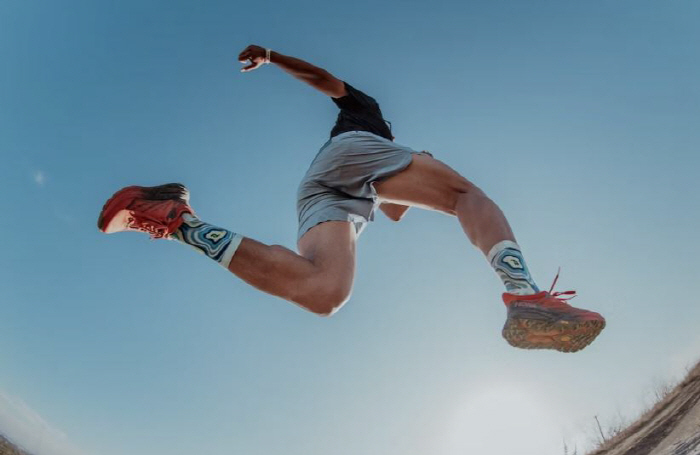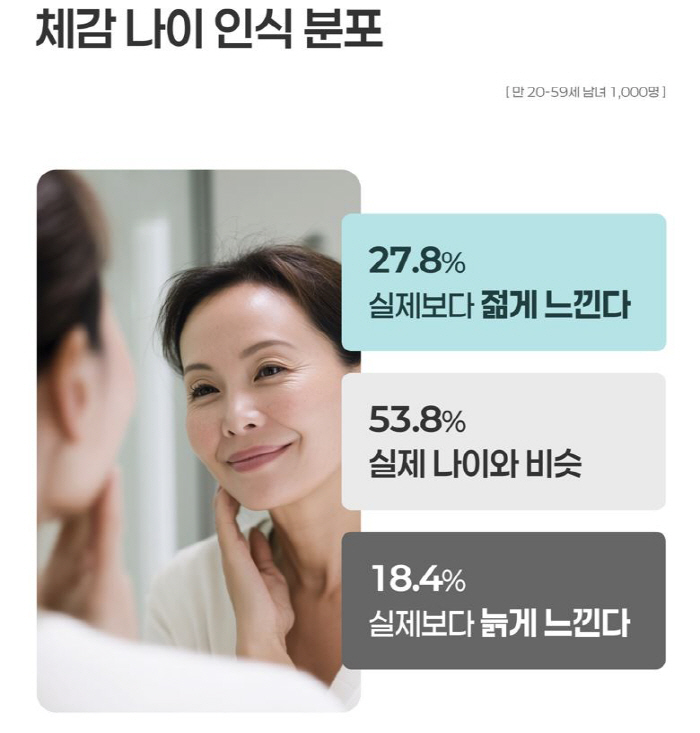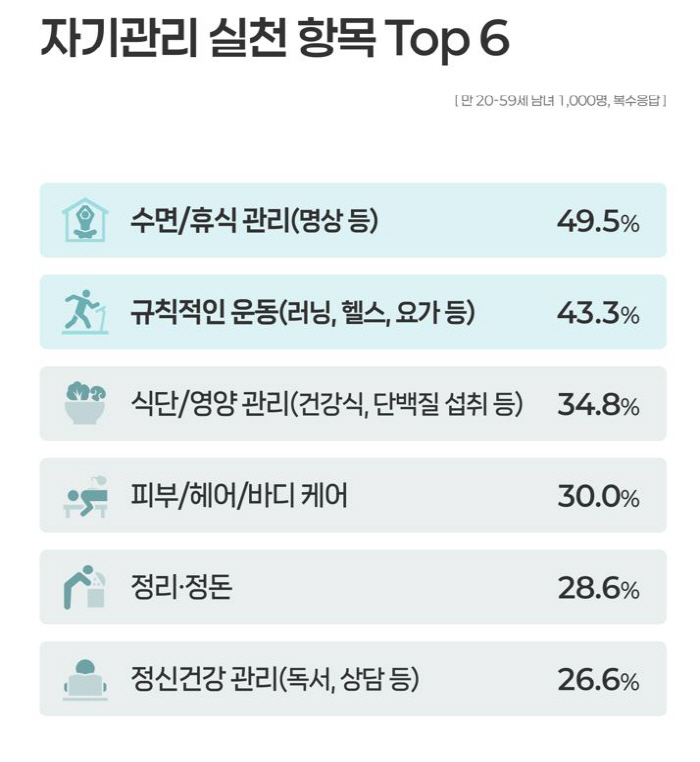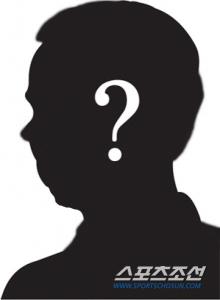1 in 3 adults feel younger than their age...Take care of yourself by resting rather than exercising
Nov 01, 2025
|
Self-management methods were selected in the order of 's sleep and rest', 'exercise', and 'food and nutrition management'.
Data consulting firm PMI announced the results of a survey of 1,000 men and women aged 20 to 59 nationwide through the 'GS&Panel' survey of self-management awareness in their 20s and 50s.
The survey was conducted to analyze changes in daily management behavior in the 20s and 50s, focusing on self-awareness of age, standards of youth, self-management habits and exercise routines.
|
53.8% of respondents said they felt similar to their actual age, 23.2% said they felt a little younger than they actually were, and 4.6% said they felt a lot younger.
On the contrary, the responses of 'I feel a little old'(14.6%) and 'I feel a lot old'(3.8%) were relatively low. In other words, about 28% of the total perceived themselves as 'young.'"
By age, the response that 'feel a little younger than it actually was' was higher in the 30s (27.9%), 40s (25.0%), and 50s (27.1%) than in the 20s (12.5%). This shows that the higher the age, the stronger the tendency to maintain psychological youth through self-management or routine.
◇The standard of youth is 'appearance'…'Energy and Attitude' is also a new standard
'The criteria for distinguishing between young and old people' (multiple answers) were overwhelmingly ranked first in the question of 'the criteria for distinguishing between young and old people'(multiple answers), followed by 'body shape, posture, and muscle mass'(41.0%) and 'fashion and style'(38.3%).
However, in addition to external factors, internal factors such as 'energy and activity (35.6%)';'External attitudes such as expressions and speech (35.6%)';' Flexibility in Thinking (34.1%)'; and'Activeness in Life (28.8%)' also showed high response rates.
This suggests that the stereotype of 'young = appearance' is weakened, and 'energy and attitude' are becoming the new standard of youth.
◇spread over exercise 'recovery-oriented routine'
'How important do you think self-care is?When asked ', 77.0% said it was important, 21.8% of which said it was very important. This shows that self-management is not just a trend or hobby, but has established itself as a 'basic area of life'. As for the self-management method currently in practice (multiple responses), 's sleep and rest management (49.5%)' is the top priority, followed by'regular exercise (43.3%)','food and nutrition management (34.8%)','skin, hair, and body care (30.0%)','clean up (28.6%)','mental health management (26.6%)', and'self-development and learning (23.9%)'.
This shows that the focus of self-management is shifting to 'recovery and stability' rather than 'performance'. In other words, 'routine of maintaining and recovering oneself in daily life' is becoming a key self-management strategy of modern people.
◇ Exercise has an overwhelming purpose of 'Health Maintenance'
As for questions about the exercise cycle, '2~3 times a week'(30.1%) was the most common, followed by 'Do not exercise'(23.1%), 'Do not exercise less than once a week'(19.1%), '4~5 times a week'(17.6%), and 'Almost every day'(10.1%).
By age, the ratio of '4~5 times a week' was high for those in their 20s (23.0%), and '3 times a week' was the most common for those in their 50s (31.9%). Younger people preferred high-frequency exercise and middle-aged people preferred steady routine-oriented exercise.
As for exercise, 'Walking and Walking (42.4%)' ranked first, followed by 'Learning (13.5%)' and 'Health·Weight (13.5%)' followed by 'Home Training (11.1%)', 'Pilates·Yoga (7.0%)'Hiking (3.6%)', 'Golf (3.5 %)', 'Swimming (2.9%)', and 'Tennis (1.7%)'.
In particular, 'learning', a hot topic these days, showed the highest participation rate among those in their 30s (23.4%).
As for the reasons for exercising, 'maintenance of health and strengthening physical strength' (70.4%) was the highest, followed by 'body and weight management' (50.7%) and 'stress relief' (31.9%).
Regarding the results of the survey, PAMI Co., Ltd. said, "The nature of self-management is changing with achievement-oriented routines for generations 2030 and recovery-oriented routines for generations 4050."Self-management is evolving into a survival routine that protects the body and mind, not just self-improvement.", he explained.
|
This article was translated by Naver AI translator.
















